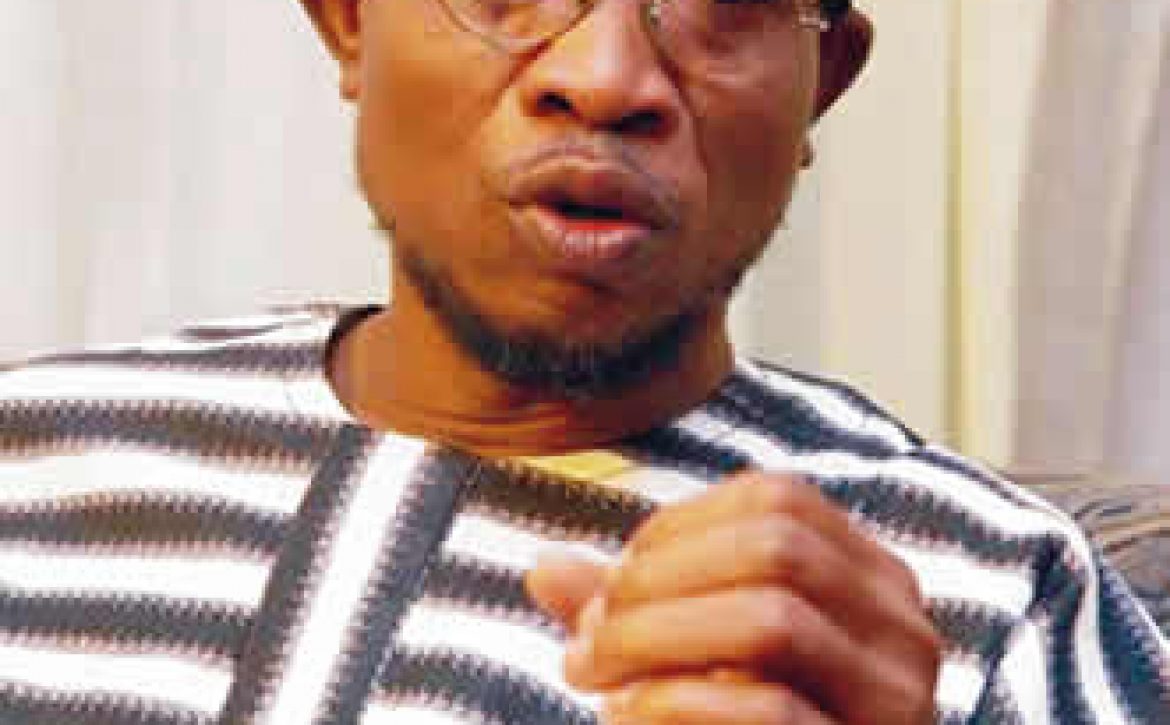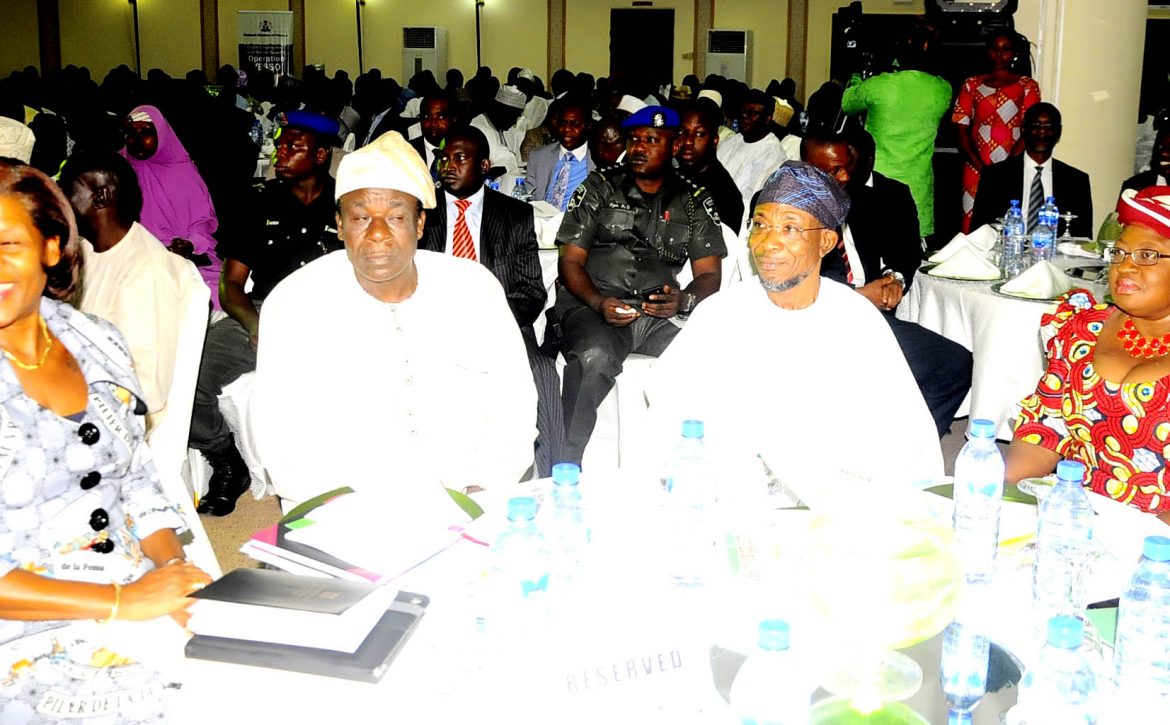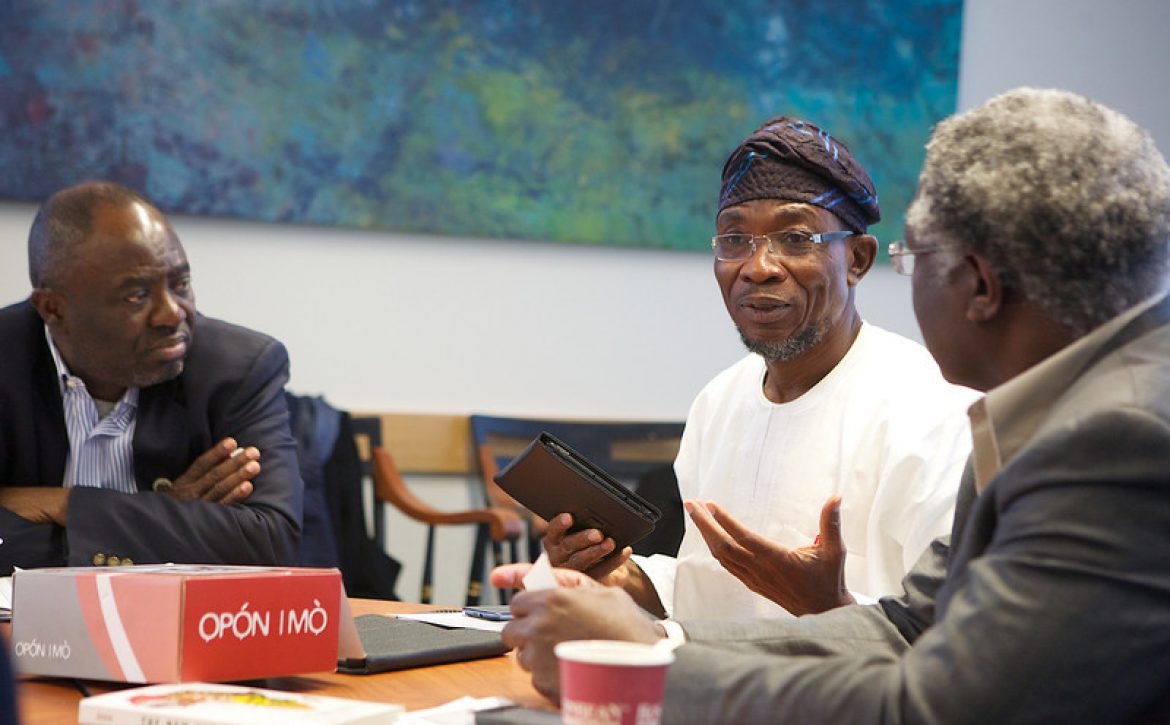 The government of the State of Osun has appropriated N100 million for the upgrading of infrastructure at the state College of Education, Ila-Orangun.
The government of the State of Osun has appropriated N100 million for the upgrading of infrastructure at the state College of Education, Ila-Orangun.
Chairman of the institution’s Governing Council Oyeniyi Akande made this known yesterday during the council’s visit to the management.
Akande said the fund was for tarring major roads leading into the institution; reconstruction of culverts and drains in the college; purchasing buses for students and workers, an ambulance for the college clinic and official vehicles for principal officers.
He said the council would supervise the projects.
Akande said the Governor Rauf Aregbesola administration was determined to improve the quality of teachers’.
He also said: “To improve the standard of education, the council has introduced and made the study of Yoruba and entrepreneurial studies compulsory.”
THE NATION
 At the 2013 Nigerian Telecom Development Lecture (NITDEL) organized by Nigeria Telecom News, at the weekend in Lagos, the Managing Director and Chief Executive Officer, Airtel Nigeria, Mr. Segun Ogunsanya believed that the implementation of the approved National Broadband Plan (NNBP) would facilitate broadband expansion in the country, saying speedy execution of the strategy document can contribute about N190 billion to the country’s GDP in 2015.
At the 2013 Nigerian Telecom Development Lecture (NITDEL) organized by Nigeria Telecom News, at the weekend in Lagos, the Managing Director and Chief Executive Officer, Airtel Nigeria, Mr. Segun Ogunsanya believed that the implementation of the approved National Broadband Plan (NNBP) would facilitate broadband expansion in the country, saying speedy execution of the strategy document can contribute about N190 billion to the country’s GDP in 2015.
Ogunsanya, who said the six per cent broadband penetration, presents a challenge and an opportunity, noted that there could be five fold increases in broadband penetration by 2017 if major challenges are removed, especially Right of Way (RoW) limitations and shortage of more spectrums.
Besides, Ogunsanya called on states’ government to make RoW approval easier for operators, stressing that the challenge of getting approval has become a major bottle neck for operators to roll out their services, stressing that atimes it cost operators about N6.5 million per kilometer legal or illegal to get access, saying that such in New Delhi in India only cost about N4 million.
 On the issue of RoW, Governor Rauf Aregbesola of Osun State, who spoke on “ICT, a tool for Societal Development” at the forum said his state was ready to resolve the challenge around RoW.
On the issue of RoW, Governor Rauf Aregbesola of Osun State, who spoke on “ICT, a tool for Societal Development” at the forum said his state was ready to resolve the challenge around RoW.
Aregbesola, however, said operators must display some level of commitment, saying that the telecoms operator must collaborate together genuinely with the states to resolve the challenges.
“I think the operators should present their case as a body that will create a neutral ground to address this issue. It is not wise for each operator to be digging the ground to lay its fibre. I think if they can collaborate, it will help them and resolve some issues around RoW”, he stated.
Interestingly, Nigeria as at last December topped Africa’s Internet penetration chart with about 48.4 million users, while Egypt and Morocco are in second and third position with 28.9 million and 16.5 million users.
But, according to analyst, Nigeria may be at the top of the chart, but comparing the penetration to the country’s population size and potential, the penetration is still low.
Minister of Communications Technology, Mrs. Omobola Johnson, corroborated this challenge, when she said that huge Internet capacity was lying untapped at the shores of the country, yet Internet penetration in the country remains abysmally low.
According to her, unless the capacity was connected to the hinterlands through last-mile connectivity, it would remain a challenge for the country in getting the capacity inland and that Internet penetration in the country would also remain a challenge.
(culled from THE GUARDIAN)
 IT was no surprise when the Federal Government invited Governor Rauf Aregbesola of Osun to its flag off ceremony of the new Youth Employment and Social Support Operation (YESSO) in Abuja on Thursday. Because the scheme took its initiative from Aregbesola’s Osun Youth Empowerment Scheme (OYES) on the recommendation of the World Bank as strong solution for the growing unemployment problem, the Osun governor’s words were important. After the launch, journalists wanted to hear from the Governor how he came by the idea and how he has trudged on with it:
IT was no surprise when the Federal Government invited Governor Rauf Aregbesola of Osun to its flag off ceremony of the new Youth Employment and Social Support Operation (YESSO) in Abuja on Thursday. Because the scheme took its initiative from Aregbesola’s Osun Youth Empowerment Scheme (OYES) on the recommendation of the World Bank as strong solution for the growing unemployment problem, the Osun governor’s words were important. After the launch, journalists wanted to hear from the Governor how he came by the idea and how he has trudged on with it:
Excerpts:
May we have an insight into how the OYES came into being?
I came about the idea of engaging the youth when I realised that our youths, especially the educated ones, were idle. The OYES was part of my campaign and everybody thought it was a joke. But as soon as I got my mandate, I started implementing the programme. We found out that about 20 percent of our youths were unemployed, and we realised that the conventional employment would hardly make any impact, and that the only way we could bring in a fairly large number of the unemployed youth would be to engage them in community, social and public work. We categorised them into Green Gang (for environmental beautification and greenery), Sanitation Czars (for sanitation), Public Works Brigade ( maintenance of roads, public buildings and infrastructure), Paramedics (emergency services and primary health support), Traffic Marshall (maintenance and sanity on the roads), Sheriff Corps (maintenance of communal peace and order) and Teacher Corps (volunteer teaching in public schools).
In fact, to our amazement, the first advertisement attracted 250,000 applicants and we picked 20,000 without any primordial consideration. We gave the beneficiaries discipline and leadership training. Without the orientation, most of them would not know why they should be that engaged. The programme attracted unwarranted condemnation from those who don’t even know why the society exists. When people queried why we asked graduates to be cutting vegetation, I asked what would they do?
Why does your administration considers the OYES a viable alternative to the conventional recruitment?
Look, how many offices do we have as a government to employ 20,000 people? The total number of staffers in the employment of Osun State is less than 20,000. So, where are the offices to give these youths white collar jobs. We moved on to engage them in what would benefit their communities. It was not stressful. A cadet does not have to work for more than two or three hours a day, and the don’t work throughout the work. They have time to do other things for themselves. Happily, so many of them took advantage of it to get themselves into other things. Some went into trading, some went into cooperative arrangements. Many of them are successful as we made it clear from the beginning that the scheme was not going to be a permanent engagement. If you serve for two years, we expect you, with the training you have received on leadership and training and the time you have to do things for yourself, to put your heart together and get something doing. We normally give the beneficiaries of the scheme the first option. In any employment opportunities in the state, we give them 60 percent consideration.
What happens to the cadets after their two-year engagement?
The first set exited in March this year some of whom were taken into direct employment and teaching in the public schools while some are working for themselves. Of course, there would be some who are still not engaged for whatever reasons. It’s a pity there are such people. But essentially, the scheme has helped the state to manage unemployment to a considerable level. In the publication of the National Bureau of Statistics, Osun has the least unemployment index in Nigeria, and that in poverty index, we are second to Niger State. I want to believe this is not unconnected to the OYES.
Do you see the YESSO launched in Abuja on Thursday as a right step by the Federal Government to tackle unemployment at the national level?
One is quite happy with this World Bank initiative in conjunction with the Federal Ministry of Finance, but it is still scratching the surface. Given the high number of youths who are in the peak of their productivity, something more drastic must be done, and my suggestion is that the Federal Government should match each state’s efforts at youth empowerment scheme to reduce unemployment rate in Nigeria. This will help to eliminate insecurity because, to me, all the security threats are the manifestation of unemployment of the youth who could be restive and be manipulated for bad things. I am miffed, disturbed and worried by the spate and scale of insecurity in the country, and there cannot be any solution to it outside providing something for the unemployed youth. If a person has something, he/she will not have time for all sorts of vices such as kidnapping, insurgency and even robbery.
The message I want to pass here is that the Federal Government can put an end to the scourge of unemployment and the consequent insecurity by creating a programme through which each state’s efforts in youth empowerment are matched. Let there be such a programme and see its positive effects. Our OYES, despite the criticism that its beneficiaries have nothing to do other than cutting grass, has paid off in terms of eliminating insecurity and ensuring youths’ contentment. I am not saying this cannot be improved on. Better ideas can come for improvement. But I am saying that within the limit of what we have done, Nigerians must look at every opportunity to create employment for themselves. Those who want to go into farming or any cooperative bonding to pursue one trade or the other, let them go into it. We must create a conducive atmosphere for this huge army of employed youths to get engaged creatively and productively.
In our population of about 160 million, the people in the age bracket of 18 and 30, which is the most productive age of everybody, cannot be less than 80 million. If there is an opportunity for these 80 million people to earn N20,000 each a month, that would amount to N160 billion a month, and over N1.9 trillion a year. What we are wasting by not engaging these youths and providing them with productive engagements and opportunity is that. If there is an additional N1.9 trillion entering the Nigeria’s economy through opportunities for this army of unemployed youths, there would be a lot of improvements. That is my take because by merely creating opportunities for these youths, you are expanding the economy. With what are paying the youth engaged in the OYES, they can hardly engage in exotic materials. So, it cannot further inflation if inflation means money chasing scarce commodities and therefore having to pay excess for their full values.
To what extent has the OYES helped to tackle insecurity in Osun State?
Osun is the safest state in Nigeria. These are not esoteric things! When you engage the segment of the society with the highest potential for mischief, what you have done is simply eliminating threats to lives and property. If you don’t have productive areas to engage the youth, they would engage themselves in all sorts of societal menace. Insecurity is at the barest minimum in Osun State.
Is this scheme sustainable?
Don’t forget that the N200 million we are paying the 20,000 beneficiaries of OYES monthly is entering the economy of the state. goes into the economy of the state to the extent that whatever you pay them as allowance will end up in large parts of the economy because a person earning N10,000 monthly would hardly go for exotic materials. He would only use the money for basic necessities like food and clothing. So, if the economy of the state is the basis of revenue to the government, for as long as there is a government and this injection into the economy, the government would get something. The scheme is sustainable and self-supporting as long as human conscious administrators are still in the state.
The OYES is a lifeline for the youth to take care of their lives. Whatever they want to do with their lives is their choice. Of course, some of them are into farming. They are free to choose whatever they want to do with their lives. They would know that we give them a lifeline for two years within which they can make anything out of their lives. We believe that with the take-off training we have given these youth, they have no reason to fail in life if they are genuine about themselves and their aspirations. They don’t work for more than three days in a week, and for each day they work, they hardly work for three hours.
The OYES is for all in the state. We have Hausa and Ibo in it. There is no discrimination. Our own scheme is open to NCE, OND, HND and first degree holders.
For me, there can be no worse abandonment of responsibilities if the educated youth are left to roam the streets. It is quite depressing. We give the beneficiaries all necessary support and expose them to opportunities for self-improvement. A large percentage of them are happy with the scheme and there is a heightened interest in it now much more than when we started.
 It was a weekend of multiple laurels for the Governor of the State of Osun, Ogbeni Rauf Aregbesola, as he clinched three awards in a day for his innovative deployment of Information Communication Technology (ICT) for good governance and commitment to the good of his people.
It was a weekend of multiple laurels for the Governor of the State of Osun, Ogbeni Rauf Aregbesola, as he clinched three awards in a day for his innovative deployment of Information Communication Technology (ICT) for good governance and commitment to the good of his people.
Aregbesola was on Saturday awarded the Best ICT (Information Communication Technology) State of the year 2013; Africa’s Most Innovative Telecom Product of the Year (Opon Imo) by the Nigerian Telecom Development at the Incubator Event Centre and the Governor of the year on Social Responsibility Award 2013 by The SERAs at its 7th Annual award in the Shell Hall, Muson Centre, Onikan, both in Lagos.
The governor was given the Social Responsibility award alongside his Katsina State counterpart, Alhaji Shehu Shema.
In his acceptance speech, Aregbesola said without ICT, it would have been difficult for his government to provide all text books needed by over 150, 000 students in its high schools.
He disclosed that to provide just 3 text books, which are not enough for the students to perform well in the final examination in WAEC and NECO, would cost his government N4.5billion annually.
He said with the introduction of Opon Imo (Tablet of Knowledge), it costs N250million for the government to provide virtual text books for all the books needed by the students to write (WAEC, NECO and JAMB) for the 150,000 students in the high schools.
The governor therefore said ICT is the future of today’s world, which all stakeholders must recognise and begin to make the best use of so as to develop the country.
He listed the various ways in which his government has deployed ICT to government business.
The governor said what is needed more in the country is the exposure of young people to the infinite potentials of the world of ICT and how they can through it, rule their world.
He stated that his government has long recognised the huge potentials of ICT for bringing qualitative improvement to bear on the lives of people and society, saying this is what his government has been doing since he became governor in the State of Osun.
“I have therefore, always tried not to miss an opportunity to apply it wherever and whenever I can to improve my situation and that of the people around me.
“Since I became governor in 2010, I gave an important place to ICT in the way business of government is run.
“One of the first areas of ICT deployment in the State of Osun was revenue reform, in which our government quickly moved to discard the old methods of payment system and tax administration, which were fraught with leakages and loopholes that were exploited to divert revenues that should accrue to the state’s coffers.
“The result was instant and stunning; our monthly internally generated revenue (IGR) jumped by 100 per cent from N300million to N600million in less than one year.
“We have since moved to consolidate our public finance reforms by deploying an ICT-driven revenue and taxation management system – The Osun State Government Electronic Banking System of Revenue Cycle Management (OSSG-EBS-RCM). This system allows for online Direct Bank Lodgment System (DBLS) of the revenue collection process.
“The DBLS, with its Communication, Database Software, Accounting and Reconciliation and Monitoring components enables the capturing of all payments information and other banking transactions on-line. It also captures other information during the payment process which the master database may require.”
Aregbesola also said that the state’s deployment of ICT to public education is now world-famous, especially through the iPad-like computer tablet, Opon-Imo (Tablet of knowledge), adding that it is not without reason that e-learning device became a novel innovation in public education in the country.
He averred that Opon-Imo is a reaffirmation of the fact that the world of ICT is a world of infinite imagination and application.
The Opon-Imo tablet was not our invention in Osun, but we have been able to do with that ICT device what no one had previously done with it. We have adapted it to our peculiar learning environment in a way that is very unique to us.
The Governor of the State of Osun, Ogbeni Rauf Aregbesola was celebrated over the weekend as he won the award for the Most Impactful Governor of the Year 2013 at the 7th SERAs Annual Award ceremony which held at Muson Center, Onikan, Lagos on Saturday

From right- Governor State of Osun, Ogbeni Rauf Aregbesola; his
wife Sherifat; Chairman on the occasion/Chairman House Committee on
Appropriation, House of Reresentatives, Hon John Owan Enoh and
Managing Partner TruContact, Mr Kan Egbas, during the presentation of
award to Governor Aregbesola as Most impactful Governor of the Year
2013, at the 7th SERAs Annual Award ceremony, at Muson Center,
Onikan, Lagos on Saturday 21st-09-2013

From rght- Chairman on the occasion/Chairman House
Committee on Appropriation, House of Représentatives, Hon John Owan
Enoh; Managing Partner TruContact, Mr Kan Egbas and Governor State of
Osun, Ogbeni Rauf Aregbesola, during the presentation of award to
Governor Aregbesola as Most impactful Governor of the Year 2013, at
the 7th SERAs Annual Award ceremony, at Muson Center, Onikan, Lagos
on Saturday 21st-09-2013

From right- Chairman on the occasion/Chairman House Committee
on Appropriation, House of Représentatives, Hon John Owan Enoh and
Managing Partner TruContact, Mr Kan Egbas; Governor of State,Osun
Ogbeni Rauf Aregbesola, his wfe, Sherifat; Mr Yomi Badejo and
Representative of Governor of Katsina State Ahaji Lawal Kankai
Ibrahim, during the presentation of award to Governor Aregbesola as
Most impactful Governor of the Year 2013, at the 7th SERAs Annual
Award ceremony, at Muson Center, Onikan, Lagos on Saturday
21st-09-2013

-From right- Governor of State, Osun Ogbeni Rauf Aregbesola and his.
wifé, Sherifat and Chairman on the occasion/Chairman House
Committee on Appropriation, House of Représentatives, Hon John Owan
Enoh, during the presentation of award to Governor Aregbesola as
Most impactful Governor of the Year 2013, at the 7th SERAs Annual
Award ceremony, at Muson Center, Onikan, Lagos on Saturday
21st-09-2013
 In the bid to reduce youth unemployment and eliminating all the security threats in the country, the federal government has been challenged to match each state government’s effort at youth empowerment scheme one on one.
In the bid to reduce youth unemployment and eliminating all the security threats in the country, the federal government has been challenged to match each state government’s effort at youth empowerment scheme one on one.
Osun State Governor Ogbeni Rauf Aregbesola, who made this call recently, insisted that the only panacea for the high rate of insecurity and threats all over the country was actively engaging the youth engagement in a sustained empowerment programme.
Speaking on the alarming rate of unemployment among the youth between the ages of 18 and 30 years, Aregbesola said “I am miffed, disturbed and worried by the spate and scale of insecurity in Nigeria and it is also clear to me that there can’t be a solution outside providing something for this army of unemployed youth.”
According to him, the youth, for lack of other things to do are often restive and uncontrollable and easy to be manipulated for any vice to be committed.
“So if federal government can say that for every youth that is engaged by any state government, they will match it with one at the federal level, it will go a long way in reducing, if not eliminating youth unemployment.”
“Federal government can really help in eliminating this scourge of unemployment by matching the states with that nobody can accuse you of favouring one state over the other. If the state employs/empowers 1,000 let the federal government also employ/empower 1,000, if the state can do 10,000 or 100,000 let the federal government match it with the same 10,000 or 100,000 and it is easier for federal government to do it,” Aregbesola stated.
LEADERSHIP
 Information Communication Technology (ICT) has the potential to open up huge possibilities that can enhance growth and development of human society.
Information Communication Technology (ICT) has the potential to open up huge possibilities that can enhance growth and development of human society.
The Governor of the State of Osun, Ogbeni Rauf Aregbesola, as a lead speaker, observed this at the 2013 Nigerian Telecom Development Lecture (NITDEL) at the Agip Hall of Muson Centre in Lagos. Aregbesola said ICT is the future of today’s world, which all must recognise and begin to make the best use of. He listed the various ways in which his government has deployed ICT to government business.
The governor said what is needed more in the country is the exposure of young people to the infinite potentials of the world of ICT and how they can through it, rule their world.
He stated that his government has long recognised the huge potential of ICT for bringing qualitative improvement to bear on the lives people and society, saying this is what his government has been doing since he became governor in the State of Osun.
“I have therefore, always tried not to miss an opportunity to apply it wherever and whenever I can to improve my situation and that of the people around me.
“Since I became governor in 2010, I gave an important place to ICT in the way business of government is run.
“One of the first areas of ICT deployment in the State of Osun was revenue reform, in which our government quickly moved to discard the old methods of payment system and tax administration, which were fraught with leakages and loopholes that were exploited to divert revenues that should accrue to the state’s coffers.
“The result was instant and stunning; our monthly internally generated revenue (IGR) jumped by 100 per cent from N300million to N600million in less than one year.
“We have since moved to consolidate our public finance reforms by deploying an ICT-driven revenue and taxation management system – The Osun State Government Electronic Banking System of Revenue Cycle Management (OSSG-EBS-RCM). This system allows for online Direct Bank Lodgment System (DBLS) of the revenue collection process.
“The DBLS, with its Communication, Database Software, Accounting and Reconciliation and Monitoring components enables the capturing of all payments information and other banking transactions on-line. It also captures other information during the payment process which the master database may require.”
Aregbesola also said that the state’s deployment of ICT to public education is now world-famous, especially through the iPad-like computer tablet, Opon-Imo (Tablet of knowledge), adding that it is not without reason that e-learning device became a novel innovation in public education in the country.
He averred that Opon-Imo is a reaffirmation of the fact that the world of ICT is a world of infinite imagination and application.
The Opon-Imo tablet, according to Aregbesola, was not an invention of Osun, but that the state had been able to do with that ICT device what no one had previously done with it.
“We have adapted it to our peculiar learning environment in a way that is very unique to us,” he said.
He added that in Nigeria the advent of GSM has given a clear indication of the transformational impact that ICT can bring to bear.
He continued: “For instance, there were only about 600,000 fixed NITEL telephone lines to over 120 million Nigerians in 2001.
“According to figures from Nigerian Telecommunications Commission (NCC), there were as at June this year, over 120 million mobile telephone subscribers, which raised the country’s teledensity from an all-time low base to a peak of 85.97 per cent in just about a dozen years. As at March, the sector’s contribution to the country’s GDP is 8.53 per cent.
“The GSM is now used for billions of Naira worth of transactions without the stress of having to leave one’s base. Yet there are still numerous areas of possible application in this sector that are yet to be exploited.”
In his own lecture, the Chief Executive Officer of Airtel Nigeria, Mr. Segun Ogunsanya, said in today’s world, ICT has transcended just being an industry and has become a way of life.
Ogunsanya said for Nigeria to attract foreign direct investment, infrastructure plays crucial role and ICT is at the head of the infrastructure.
According to him, in the spate of 12 years of revolution in ICT, the sector has become the largest contribution to the nation’s economy after oil with an 8.6 per cent contribution to the Gross Domestic Products (GDP).
Earlier in his remark, the Chairman of Nigerian Communications Commission, Chief Peter Igho, said a nation without ICT could hardly realise its goal of existence as a country.
Igho, who was represented by Mr. Tony Ojobo, said a nation that develops its ICT has greater potentialities to develop than a nation without ICT infrastructure.
 Teachers in the State of Osun have been advised to embrace Information Communication Technology [ICT] in order to key into the latest trends in the world.
Teachers in the State of Osun have been advised to embrace Information Communication Technology [ICT] in order to key into the latest trends in the world.
Mr. Sunday Owoeye, Head of Service, State of Osun gave the advice at a seminar organised for newly recruited teachers into the state primary schools, in Osogbo. The ICT centre will be used for learning and research by student. The head of service noted that the technology will greatly assist the teachers in their delivery in the classroom.
He charged the teachers to be good role models to their pupils, “The process that brought you in as teachers into the state primary education is an indication of credibility that remains our watchword in Osun,” he said. “This is the first time any state government in Nigeria will engage the service of the Joint Admission and Matriculation Board for the purpose of conducting aptitude tests for applicants.”
“We are consciously doing this to guide against inefficiency in our public schools as primary education is the bedrock of all the strata of education.’’ he stated.
Owoeye explained that the state organised the training for the new entrants to enhance the teachers’ intellectual quality and performances in the classroom, while charging them to be industrious and fear God in the discharge of their duty.
“Certainly, special blessing await you from God if you commit yourself to this job without cutting corners,’’ he said.
He described the recruitment exercise that led to the employment of the 3,000 teachers as unique and unprecedented in the annals of the state.
A cross section of year 2013 Pilgrims from the State of Osun during one of
the Hajj rites in the holy mosque of the Prophet in Madeenah, Saudi Arabia



 The Governor of the State of Osun, Ogbeni Rauf Aregbesola, Thursday appealed to governments at all levels to produce tangible framework for addressing youth unemployment in order to complement ongoing initiatives by the federal government.
The Governor of the State of Osun, Ogbeni Rauf Aregbesola, Thursday appealed to governments at all levels to produce tangible framework for addressing youth unemployment in order to complement ongoing initiatives by the federal government.
Speaking at the inauguration of the Youth Employment and Social support Operation (YESSO) in Abuja, Aregbesola said the scheme was a forward leap in the nation’s drive to surmount the scourge of youth unemployment.
The governor said he was glad that the idea of job creation through the Osun Youth Empowerment Scheme, which led to the creation of 20,000 jobs within the first 100 days had now transformed into a national programme.
He said: “I am of the strong view that any society where there is high incidence of youth unemployment offers a conducive environment for the development of vices, social tension and other manifestations of social dysfunction.
“Thus, a society with high rate of youth unemployment is a gun powder waiting to explode. It is common knowledge that idle youths are the most vulnerable group in human society for easy manipulation and mischief-making.”
Aregbesola said given that energy, vibrancy and creative talents abound in young people, they should be properly channelled into productive engagement.
He said: “Therefore, it is a matter of governance imperative that youths must be kept positively engaged by any government that is serious about the task of social and economic development. Keeping young people meaningfully engaged is not only a sound economic policy; it is a sensible approach to good governance. For no effective or successful governance can take place where there is rampant unemployment among the youths.”
 Meanwhile, the Coordinating Minister for the Economy and Minister of Finance, Dr. Ngozi Okonjo-Iweala, while inaugurating the scheme, said the initiative was part of efforts to create full enterprises and reduce poverty.
Meanwhile, the Coordinating Minister for the Economy and Minister of Finance, Dr. Ngozi Okonjo-Iweala, while inaugurating the scheme, said the initiative was part of efforts to create full enterprises and reduce poverty.
The minister, who said the transformation agenda was designed not only to grow the economy but to create jobs for the youth and unskilled, noted that the scheme would help to build human capital and empower communities in the country.
She said: “This programme is complementing the Subsidy Reinvestment and Empowerment Programme (SURE-P). This administration is determined to make a difference and we are glad that the states are here and we are going to have a very tight collaboration to ensure that this $300 million devoted to this operation would go to very specific things.”
Speaking also, the World Bank’s Country Director, Marie Francoise Marie-Nelly, had praise the initiative, which she said, would benefit all the states.
She said: “We aim to reduce extreme poverty with particular focus on youths, and also educating them as well as providing skills. There is a strong focus of providing a social safety net platform because we know that one major constraint of the poor to access educational services is poverty.”
Marie-Nelly said the programme would focus on strengthening national institutions, adding that about 40 per cent of the participants would be women and girls.
THIS DAY










